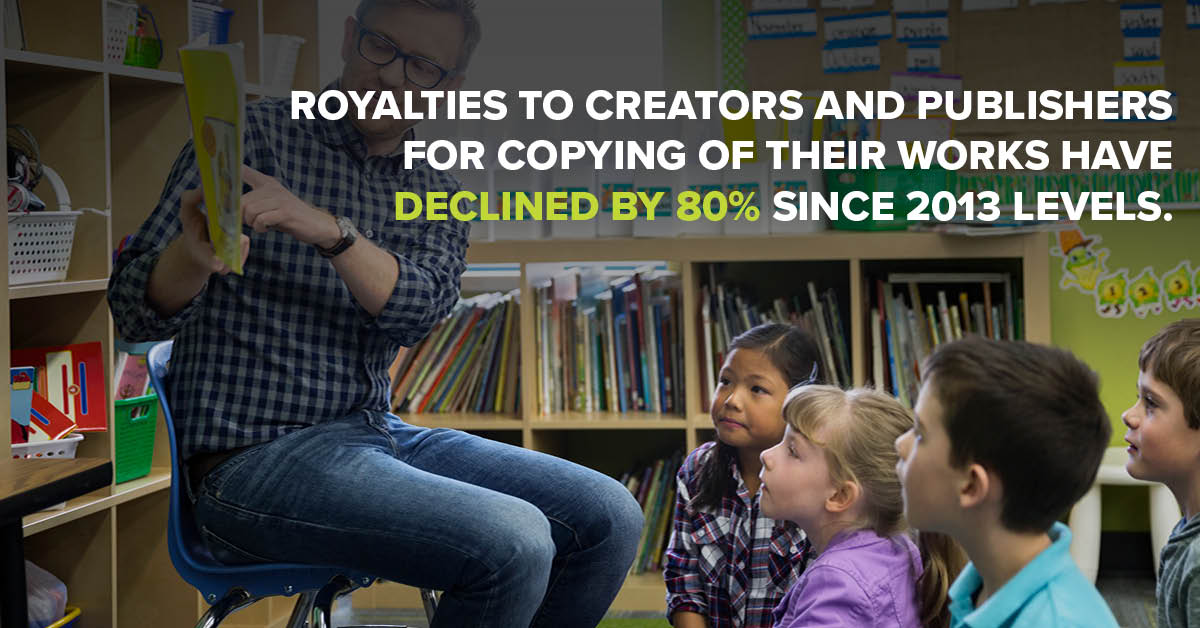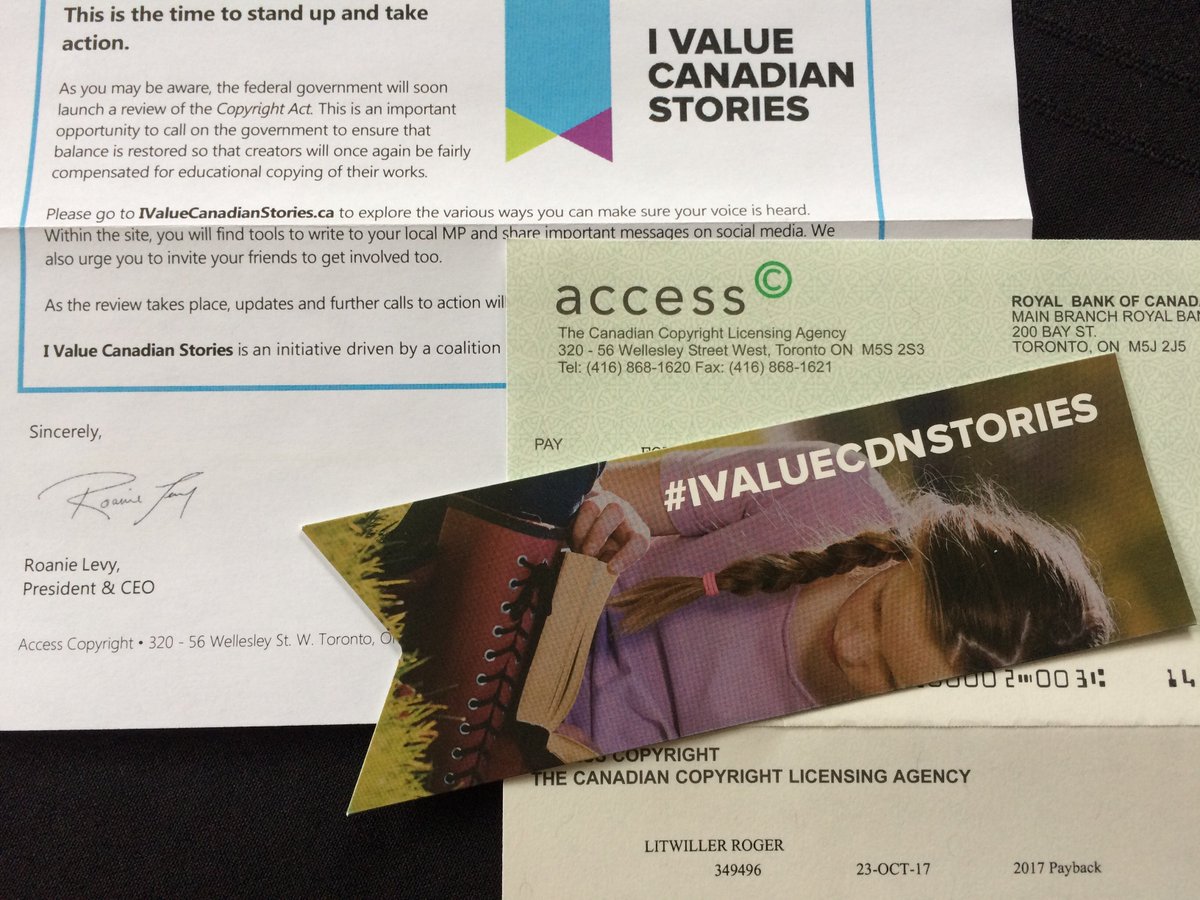Annual cheques from Access Copyright were distributed this week and so was a news release from the association.
Check out Writescape’s previous blogs about the long struggle that Access Copyright has fought of behalf of creators. Today we continue to keep you updated.
- April 2018 – background to the legal struggle
- May 2018 – the Parliamentary Review and Submission to the Industry Committee
- August 2018 – How writers can get involved and help
- January 2019 – update as we wait for a decision
- January 2020 – The courts side with creators and order payment by March 9 2020

Unfortunately, despite a favourable decision from the courts, no payment was forthcoming and the appeal process began. This month, the matter heads to the Supreme Court of Canada.
Here is the complete and unedited release that was emailed to members:
TORONTO [October 15, 2020] – The Supreme Court of Canada announced today that it will hear the appeals of both Access Copyright and York University in the litigation between the two parties that began in 2013.
This decision is another chapter in a decade-long struggle by creators and publishers to be fairly paid for the copying and use of their works by the education sector. As a result of the sector’s self-interpretation of changes made to the fair dealing sections of the Copyright Act in 2012, they adopted and have continued to follow copying guidelines that have resulted in hundreds of millions of pages of copyright-protected works being copied per year without payment. Both the Federal Court at trial and the Federal Court of Appeal determined these self-interpreted guidelines are not fair in either their terms or application. To date, Canada’s creators and publishers have been deprived of over $150 million in royalties owed to them by the education sector under tariffs approved by the Copyright Board of Canada that the sector has overwhelmingly refused to pay.
This protracted legal proceeding is reflective of a copyright system that users have badly broken. This wasn’t always so. Prior to the changes to the Copyright Act in 2012, through collective licensing and a functioning tariff system, educational institutions paid creators and publishers for the works they copied.
At a time when our country is focused on economic recovery from the impact of COVID-19, our creative sector has been hit harder as a result of the education sector’s refusal to pay for the use of creators’ works. The federal government needs to take decisive action to remove any uncertainty surrounding our copyright laws and restore a well-functioning marketplace for copyright-protected works that is predictable and transparent where creators can be paid fairly and promptly.
“Canadian creators and publishers have been deprived of fair payment by the education sector for almost a decade,” said Roanie Levy, President & CEO of Access Copyright. “COVID-19 has made the wound of not being paid even more painful. Our copyright system is not working. It is fraught with uncertainty and the federal government needs to roll up its sleeves and take immediate action.”
If you haven’t done so already, we encourage you to get informed. Visit
Access Copyright’s website or take the time to read the posts we’ve shared
here with the timeline of this long and difficult road to prove our work is
valuable and worth protecting.




 The outcome of the session is a testament to the hard work that our community has been doing with the INDU Committee. The number of creators and publishers who have shared their personal stories during their recent cross-country tour have made an incredible difference by putting a relatable face to the problem, making it more difficult to ignore.
The outcome of the session is a testament to the hard work that our community has been doing with the INDU Committee. The number of creators and publishers who have shared their personal stories during their recent cross-country tour have made an incredible difference by putting a relatable face to the problem, making it more difficult to ignore. Written submissions are meant to be brief and can be as simple as a one-page letter outlining your personal story of impact. They will help to keep reinforcing that Canadian creators and publishers have been hurt economically by 2012 changes to the Copyright Act and that the continued creation of Canadian content is at stake during this review.
Written submissions are meant to be brief and can be as simple as a one-page letter outlining your personal story of impact. They will help to keep reinforcing that Canadian creators and publishers have been hurt economically by 2012 changes to the Copyright Act and that the continued creation of Canadian content is at stake during this review. Here are some basic things to keep in mind for a submission.
Here are some basic things to keep in mind for a submission. ngage Through I Value Canadian Stories
ngage Through I Value Canadian Stories Access Copyright
Access Copyright Then in 2013 the ministries of education and post-secondary institutions walked away from long-standing licensing agreements. According to Access Copyright, over 600 million pages are now copied FOR FREE each year by that sector. Education’s new copying policies have devastated royalty income for creators and publishers resulting in a whopping 80% decline.
Then in 2013 the ministries of education and post-secondary institutions walked away from long-standing licensing agreements. According to Access Copyright, over 600 million pages are now copied FOR FREE each year by that sector. Education’s new copying policies have devastated royalty income for creators and publishers resulting in a whopping 80% decline. Access Copyright felt it was time to take the matter to court. They sued York University for non-payment of mandatory fees (known as the Interim Tariff) and York counterclaimed that they did not have to pay because their actions constituted “fair dealing” under Fair Dealings Guidelines.
Access Copyright felt it was time to take the matter to court. They sued York University for non-payment of mandatory fees (known as the Interim Tariff) and York counterclaimed that they did not have to pay because their actions constituted “fair dealing” under Fair Dealings Guidelines.
 One of the many hats I wear, is that of a tax preparer at a local accounting office, which I have done for decades, so I do know a thing or two about filing Canadian taxes. And since 2009, Writescape has periodically offered a
One of the many hats I wear, is that of a tax preparer at a local accounting office, which I have done for decades, so I do know a thing or two about filing Canadian taxes. And since 2009, Writescape has periodically offered a 
 That depends on whether you are, by
That depends on whether you are, by  Foreign T slips you may receive include a
Foreign T slips you may receive include a  Most contest winnings are considered “
Most contest winnings are considered “